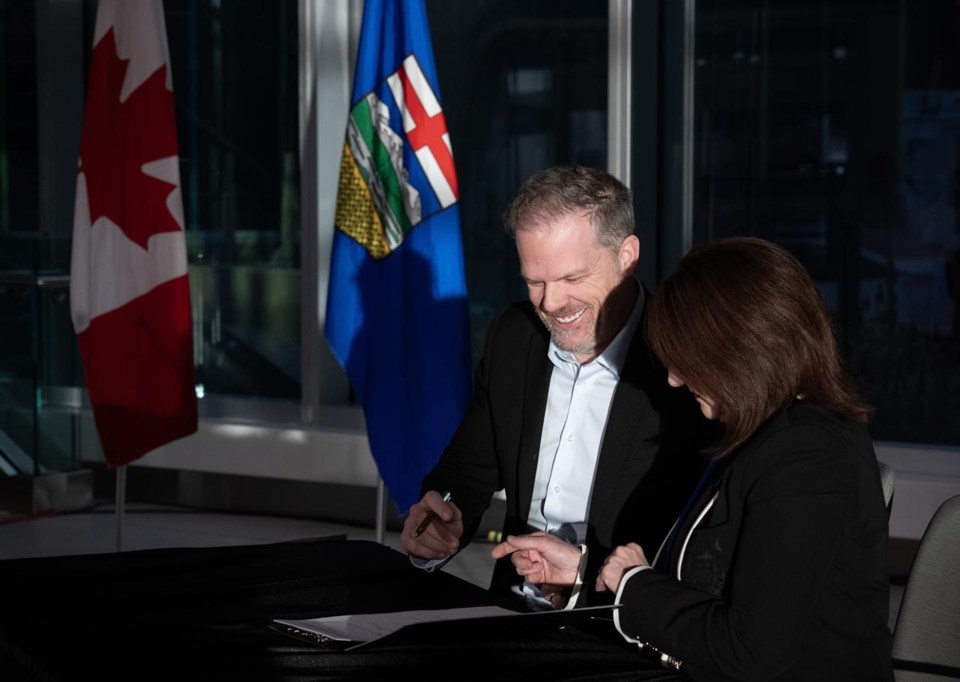CALGARY — The Alberta government is committing $200 million to help family doctors keep the lights on while a new funding agreement with physicians is hammered out.
“This is stabilization money to keep those practices going,” Dr. Paul Parks, president of the Alberta Medical Association, told a news conference Thursday, standing alongside Premier Danielle Smith and Health Minister Adriana LaGrange.
Parks said Alberta’s billing system has not kept up with office and administration costs for family physicians, a problem made worse by inflation, forcing more and more to decide whether to stay in general practice or switch to a specialty.
“It’s very difficult to actually keep your lights on, keep your offices (open), pay your staff,” said Parks.Â
“Family physicians are small business owners.”
Parks and LaGrange said they are still working out the criteria for how the $200 million will be distributed over the next two years while the medical association and government continue to work out a funding deal to replace the existing fee-for-service model.
Parks said the new model needs to reflect more comprehensive care of patients, taking into account face-to-face patient time, prep time and extraordinary administrative duties that come with caring for a large cohort of patients.
The province says current base funding for family care physicians will be almost $1.8 billion this fiscal year.
LaGrange said the $200 million will supplement previously announced funding, including $57 million over three years to help primary care providers cope with a rising roster of patients.
LaGrange said the money meshes with the broader restructuring of Alberta’s entire health delivery system over the next two years.
“We are refocusing the health-care system to make primary health care the foundation of the entire system,” said LaGrange.
“This includes setting up a primary care organization by the fall of 2024 that will co-ordinate primary health-care services with the goal of having every Albertan attached to a primary care provider.”
Alberta, like other provinces, is facing an acute shortage of family physicians, a problem that has a disastrous domino effect through the health system as more patients without primary care seek aid in crowded emergency departments.
The $200 million will come from a $1.06-billion, three-year agreement finalized with the federal government earlier Thursday at an announcement hosted by LaGrange and her federal counterpart, Mark Holland.
LaGrange said that along with more money for primary care, the funding deal with Ottawa will go to improving wait times for urgent care and providing more mental health and addiction services.
Alberta becomes the third province to reach an agreement with Ottawa after British Columbia signed a similar one in October and Prince Edward Island inked its deal on Tuesday.
The bilateral deals are part of a $196-billion, 10-year national health accord Prime Minister Justin Trudeau offered to premiers in February.
"We know the challenges that face our health-care system are profound," Holland told the news conference at the soon-to-be opened Arthur J.E. Child Comprehensive Cancer Centre in Calgary.Â
"Across the country, folks are having difficulty accessing a family health team, getting access, having a relationship with a doctor to make sure they get the health care they need. We have backlogs."
Provinces and territories are expected to commit to massive upgrades to digital medical records and the collection of health-care data, as well as being held to account for meeting targets and timelines.
Quebec remains the only province that hasn't agreed in principle to the accord, with Premier François Legault pushing back against conditions the federal government has put on the funding.
This report by The Canadian Press was first published Dec. 21, 2023.
— with files from Dean Bennett in Edmonton
Colette Derworiz, The Canadian Press




